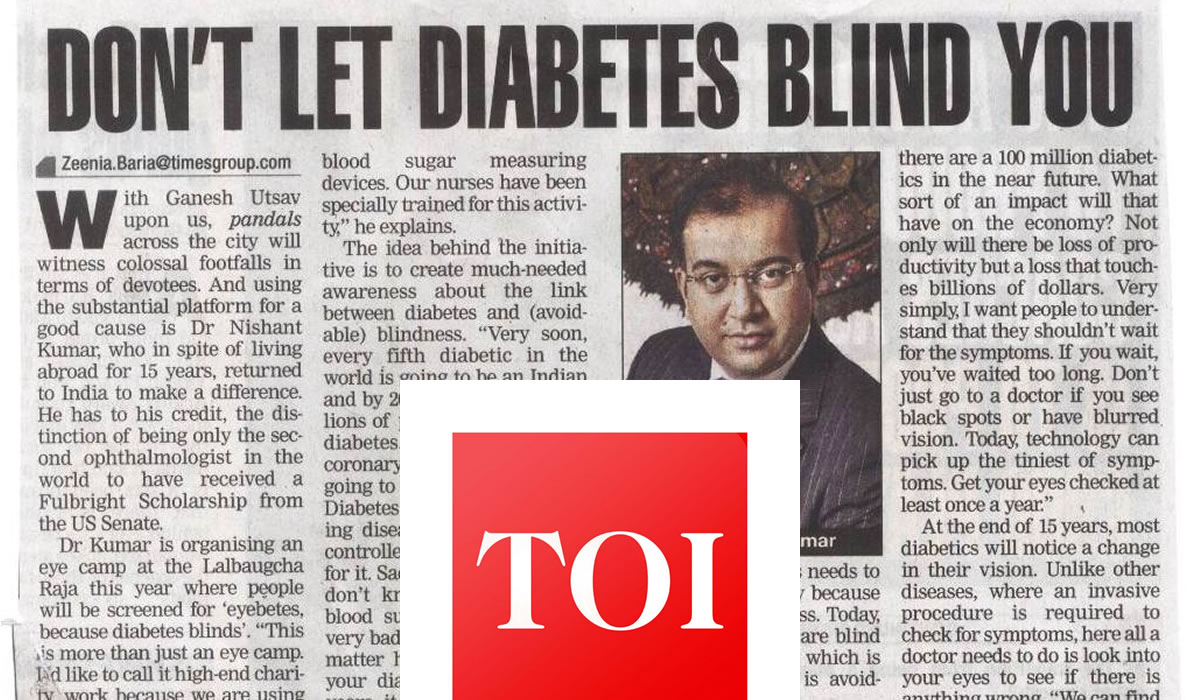Don’t let diabetes blind you – Times Of India

With Ganesh Utsav upon us, pandals across the city will witness colossal footfalls in terms of devotees. And using the substantial platform for a good cause is Dr Nishant Kumar, who in spite of living abroad for 15 years, returned to India to make a difference. He has to his credit, the distinction of being only the second ophthalmologist in the world to have received a Fulbright Scholarship from the US Senate.
Dr Kumar is organising an eye camp at the Lalbaugcha Raja this year where people will be screened for ‘eyebetes, because diabetes blinds’. “This is more than just an eye camp. I’d like to call it high-end charity work because we are using the best of technology, state-of-the-art cameras and the latest blood sugar measuring devices. Our nurses have been specially trained for this activity,” he explains.

The idea behind the initiative is to create much-needed awareness about the link between diabetes and (avoidable) blindness. “Very soon, every fifth diabetic in the world is going to be an Indian and by 2050, there will be millions of people suffering from diabetes. After cancer and coronary heart disease, this is going to be the next big killer. Diabetes is a chronic debilitating disease that can only be controlled — there is no cure for it. Sadly, what many people don’t know is the fact that blood sugar affects the eyes very badly in the long run. No matter how well you control your diabetes, after 15 to 20 years, it will impact and alter your vision. It is inevitable that your eyes will get affected. This is why diabetes needs to be monitored closely because it can cause blindness. Today, almost four million are blind because of diabetes, which is terrible because it is avoidable,” he explains.
Twenty years ago doctors could do little to tackle this problem. Currently, however, the scenario is far different. “Today, if any patient goes blind because of diabetes, it is a failure on the part of the doctor and the medical system. In India, there is very little awareness about diabetes, which is still considered a niche speciality. There are also lots of myths around it. For example, if one can see well or there is no change in their spectacle number, people assume their eyes are fine. But it is exactly this that is actually destroying the country. Don’t wait for your eyes to develop problems or your vision to fade before approaching a doctor. Don’t wait for the eventuality when you lose your vision. Screening picks up the signs early and reduces chances of blindness.”
Diabetes is a big epidemic that can have serious repercussions not only on an individual and his family but also on society and, in turn, the nation, he says. “Imagine if there are a 100 million diabetics in the near future. What sort of an impact will that have on the economy? Not only will there be loss of productivity but a loss that touches billions of dollars. Very simply, I want people to understand that they shouldn’t wait for the symptoms. If you wait, you’ve waited too long. Don’t just go to a doctor if you see black spots or have blurred vision. Today, technology can pick up the tiniest of symptoms. Get your eyes checked at least once a year.”
At the end of 15 years, most diabetics will notice a change in their vision. Unlike other diseases, where an invasive procedure is required to check for symptoms, here all a doctor needs to do is look into your eyes to see if there is anything wrong. “We can find out if the blood vessels in the eyes are getting damaged. Eyes are a reflection of your health, not just your soul! Modify your diet and lifestyle so that you lower your chances of developing diabetes in the first place,”advises Dr Kumar.
Screening and awareness programs will run till September 13 where diabetic pilgrims visiting Lalbaugcha Raja will be tested for changes in the eyes free of cost. Their vision will be checked and retina assessed using digital cameras. Each patient will receive a report of their results. Hundreds of medical experts are expected to be a part of this project, which hopes to create a world record for the largest number of people screened for eyebetes in a single location.
“We are hoping that devotees who come to the pandal, go back and tell their family and friends about eyebetes. Our principle aim is to send this message out to as many people as possible,” he ends.


